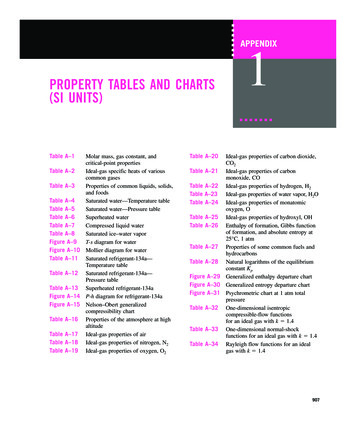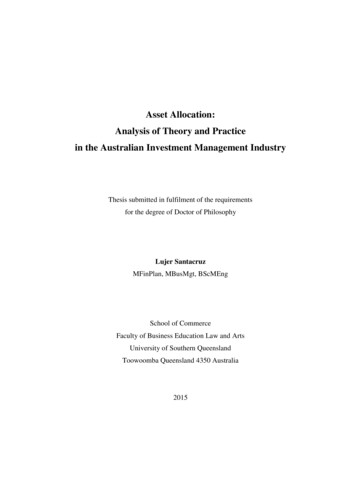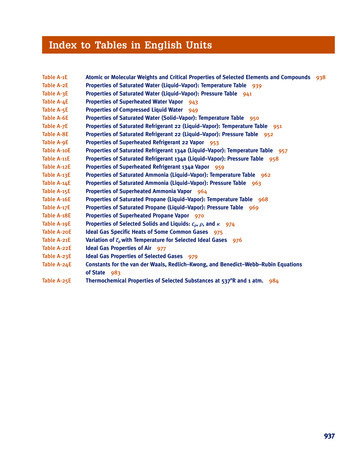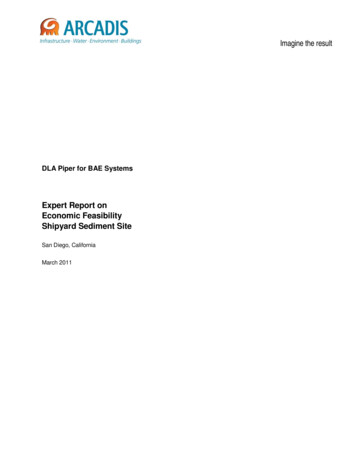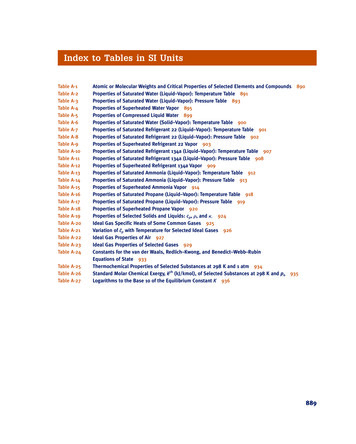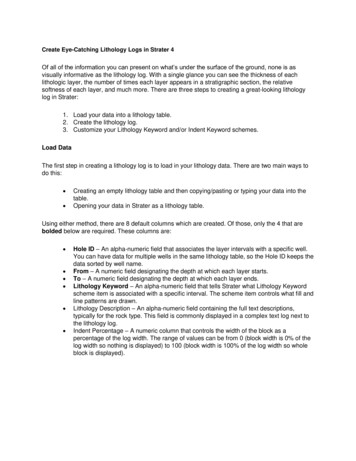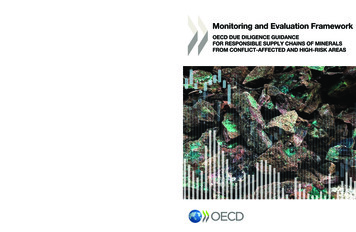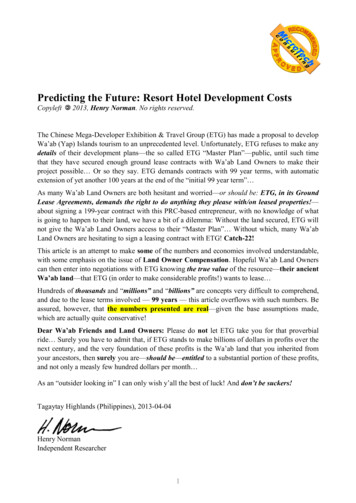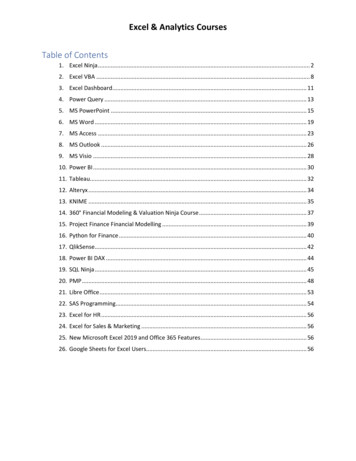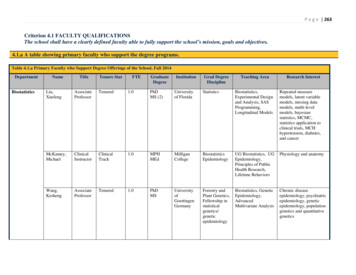
Transcription
P a g e 263Criterion 4.1 FACULTY QUALIFICATIONSThe school shall have a clearly defined faculty able to fully support the school’s mission, goals and objectives.4.1.a A table showing primary faculty who support the degree programs.Table 4.1.a Primary Faculty who Support Degree Offerings of the School, Fall 2014DepartmentBiostatisticsNameTitleTenure StatFTEGraduateDegreeInstitutionGrad DegreeDisciplineTeaching AreaResearch MS (2)Universityof FloridaStatisticsBiostatistics,Experimental Designand Analysis, SASProgramming,Longitudinal ModelsRepeated measuremodels, latent variablemodels, missing datamodels, multi-levelmodels, bayesianstatistics, MCMC,statistics application toclinical trials, MCHhypertension, diabetes,and yUG Biostatistics, UGEpidemiology,Principles of PublicHealth Research,Lifetime BehaviorsPhysiology and MSUniversityofGoettingenGermanyForestry andPlant Genetics,Fellowship tics, GeneticEpidemiology,AdvancedMultivariate AnalysisChronic diseaseepidemiology, psychiatricepidemiology, geneticepidemiology, populationgenetics and quantitativegenetics
P a g e 264DepartmentNameTitleTenure StatAssistantProfessorTenure Track1.0Vacant – search underwayBaker, Katie AssistantTenure tyZheng,ShiminCommunityand BehavioralHealthFTEGraduateDegreePhDMS (2)InstitutionUniversityof AlabamaGrad DegreeDisciplineBiostatisticsTeaching AreaResearch InterestBiostatistics,Categorical DataAnalysis, AdvancedMultivariateAnalysis, AppliedEpidemiologicAnalysis, SASProgrammingStatistical distributiontheory, longitudinal dataanalysis, categorical dataanalysis, statisticalsimulation, multivariateanalysis, survivalanalysis, sample size,model selection, CVD,cancer, depression andsubstance abuseCommunityand BehavioralHealthSystems Approachesto Public Health,HealthCommunication,CommunityOrganization forHealth EducationSkin cancer prevention,Prescription drugabuse/misuse, practicebased research (systemsalignment, evaluation),Parent-based red1.0PhDStateUniversityof NewYork,AlbanyClinicalPsychologySocial andBehavioralFoundations,Community HealthResearch, GrantDevelopmentSkin cancer prevention,health promotion, cancercontrol, measurementissues, decision theory,theoretical models ofhealth yand BehavioralHealthPublic healthundergraduate educationLittleton,Mary AnnAssociateProfessorTenured1.0PhDUniversityof ergingTechnologies, FamilyHealth, First Aid,Lifetime Behaviors,Field ExperienceRural Health,CommunityAssessment, StressManagement,ThanatologyCommunity healtheducational strategiesusing community healthadvisor approaches andparticipatory researchmethods
P a g e 265DepartmentEnvironmentalHealthNameTitleTenure StatFTEGraduateDegreePhDMPHInstitutionPack, RobertProfessorTenured1.0Teaching AreaResearch InterestEvidence BasedPublic Health, HealthAssessment andSurveillanceResearchAdolescent health, publichealth workforcedevelopment, prescriptiondrug PHEastTennesseeStateUniversityHealth CareAdministrationFirst Aid,Community Health,Medical TerminologyEmergency care training,disaster preparedness andresponseSlawson,DeborahAssociateProfessorand ChairTenured1.0PhDMSUniversityof MemphisEducationalResearch,Methodologyand EvaluationSchool-based healthpromotion, evaluation andresearch, energy balanceand obesity in childhoodand nityand villeHealthEducationTenured1.0PhDMSUniversityof Californiaat DavisEcologyLifetime Behaviors,Consumer HealthEducation, Social andBehavioralFoundations,Evaluation Research,Health AssessmentGerontology &health, InternationalHealth, GrantDevelopment,Systems Thinking inPublic HealthEmergingTechnology,Principals of PublicHealth Education,International Health,ESSENTIALSEnvironmentalHealth edMaier, KurtProfessorand ChairMetts, f MichiganEnvironmentalHealthSciencesUniversityof AlabamaBirminghamGrad ironmentalSanitation, AirPollution, ProgramPlanningSchool-based healthpromotion, evaluation andresearch, adolescentobesity prevention,healthy agingAdolescent health andobesity, distanceeducation and trainingMonitoring andevaluation of water stream restorationprogramsIndoor air quality, airpollution
P a g e 266DepartmentEpidemiologyNameTitleTenure edLi, d aching AreaResearch InterestUniversityof FloridaWater Supplies &Treatment, Env.Chemistry, Env.Microbiology, Env.Risk AssessmentPublic Health Law,Hazardous Materials,Occupational HealthEnv. microbiology &water quality, soil andwater pathogens,environmental assessmentand risk analysisEthical, legal, social andpolicy implications ofbiomarkers, entalHealthSciencesTenure Track1.0PhDAssistantProfessorTenure Track1.0PhDMScUniversityof NorthCarolina,Chapel HillUniversityof Montreal,CanadaPublic ntal health riskassessment,environmental policyEpidemiologyEpidemiology,Chronic DiseaseEpidemiologyMultiple risk factors forchronic disease,prescription drug abuseKozinetz,ClaudiaProfessorand ChairTenured1.0PhD,MPHUniversityof diatric epidemiology,environmental effects onchildren’s health, HIVand AIDS in childrenMaisonet,MildredAssistantProfessorTenure miologyPopulation studies ofendocrine disrupters andtheir effects on child andadolescent developmentQuinn,MeganAssistantProfessorTenure ologyCancer Epi,Infectious DiseaseEpi, Field EpiAdverse child experiencesand adult healthoutcomes, cancerepidemiology, globalhealth
P a g e 267DepartmentHealthSciencesNameTitleTenure enure InstitutionGrad DegreeDisciplineTeaching d Epi,Multivariate analysisChronic diseaseepidemiology, maternaland child health, obesityPhDState U. ofNew ancer e Sciences BiotechnologyTenure Track1.0PhDUniversityof GeorgiaCell BiologyAnatomy andPhysiology,Introduction toMicrobiology,Human AnatomyHuman Anatomy andPhysiology, ClinicalParasitologyProfessorand ChairTenured1.0PhDMSS. P.Universityof IndiaMicrobiologyAlternative teachingtechniques, continuingeducation for healthscience students andteachersActive-learningpedagogies in sciencecurricula, pedagogicalapproaches for nontraditional studentsBacterial iron sorTenured1.0PhDMSETSUCollege ofMedicineUniversityof NorthDakotaUniversityof ured1.0PhDUniversityof tomy andCell rial Physiology,BiotechnologyHuman AnatomyHuman Anatomy,Anatomy andPhysiologyMicrobiology,Microbial logyAnatomy andPhysiologyResearch InterestNeuropathology ofdepression and autismGravity and humanphysiologyBacterial geneticsInnate immunity, historyof microbiology andimmunologyGastro-intestinalphysiology
P a g e 268DepartmentHealthServicesManagementand PolicyNameTitleTenure fiongAssistantProfessorTenure Track1.0Peterson,JonathanAssistantProfessorTenure ure Track1.0PhDMSWilliams,BurlBeatty, 1.0Universityof MontanaSt. LouisUniversityAnatomyTenure houry,AmalProfessorand ChairTenured1.0PhDMPHJohnsHopkinsUniversityHealth 1.0DrPHEastTennesseeStateUniversityPublic . ofTennesseeMemphisUniversityof AlabamaGrad DegreeDisciplinePhysiologyCell BiologyMicrobiologyMicrobiologyPublic HealthSciencesTeaching AreaResearch InterestHuman Physiology,Human Anatomy,NeurologyAnatomy andPhysiologyObesityMicrobiology,Virology, HumanGenetics, tomy andPhysiologyHealth ServicesAdministrationHIV/AIDS preventionHealth ServicesAdmin, ManagingHealthcare Org., QIHealth ServicesAdmin, SupervisedResearch, GraduateField ExperienceHealth Systems,Health Policy, RuralHealth Research andPracticePhilosophy of Publichealth, HealthSystems, HealthServices PlanningObesity and diabetesrelated metabolic changesBacterial pathogenesis,bacterial signaltransductionRespiratory physiologyPublic health systems andservices research, publichealth accreditation,public health-hospitalcollaborationHealth care mergers,long-term careWomen’s health care,breast cancer control,program evaluation,health disparitiesTobacco policy, globaltobacco control,cardiovascular healthmanagementMen’s health, racial andethnic health disparities,cancer educationprevention policy, healthadvocacy, communitybased participatoryresearch (CBPR), healthservices evaluation
P a g e nt, Search underwayVacant, Search underwayTenure TulaneUniversityGrad icalMedicineTeaching AreaPublic HealthLeadership andEthics, Social Justice,Doctoral SeminarResearch InterestHealth promotion anddisease preventionstrategies, internationalhealth issues, socioeconomic disparities
P a g e 2704.1.b If the school uses other faculty, summary data on their qualifications should be provided in table format.Table 4.1.b Other Faculty Used to Support Teaching Programs, AY 2014-15Department(school)NameTitle/AcademicTitle & Current EmployerSpecialty AreaRank(program)FTEor %TimeGraduateDegreesEarnedDiscipline forgraduatedegreesTeaching AreasBiostatisticsLiu, YaliAssociateProfessorDepartment of Mathematicsand Statistics, ETSU25%PhD, MSStatisticsStatistical Methods I and IICommunity andBehavioral HealthAdinolfi, AntoniaAdjunct FacultyETSU10%MPHPublic HealthLifetime Behaviors for HealthyLivingBlackwell, RogerAdjunct FacultyETSU20%DrPHPublic HealthCultural CompetenceColeman, BruceFaucette, SueHousenick, MeganAdjunct FacultyAdjunct FacultyAdjunct Faculty22.5%50%10%EdDMAMPHEducationEducationPublic HealthEmergency Disaster ResponseFirst AidMedical TerminologyO’Connell, BethInstructor10%MPHPublic HealthIntroduction to Public HealthStrickland, KateAdjunct FacultyETSUETSUDoctoral candidate, Departmentof Community and BehavioralHealth, ETSUDoctoral candidate, Departmentof Community and BehavioralHealth, ETSUETSU10%EducationGerontology in HealthTettey, GraceWalker, NatalieAdjunct FacultyInstructor10%10%Public HealthPublic Health,Social WorkMedical TerminologyCommunity HealthCraig, ChrisAdjunct FacultyETSUDoctoral candidate, Departmentof Community and BehavioralHealth, ETSUDirector of Env. Programs,First Tennessee Dvlpt. thSolid Waste ManagementFaddis, JasonAdjunct Faculty25%MSHealth PhysicsGreen, ChrisInstructor20%MPHAdjunct thPrinciples of RadiologicalHealthEnvironmental HealthLane, TravisSeeley, ThomasAdjunct FacultyHealth Physicist III, NuclearFuel Services, Inc.PhD candidate, Department ofEnvironmental Health, ETSUIndustrial Hygienist, TN Dept.of Labor and Workforce DvlptJudge, Washington CountyJustice Center30%JDEnvironmentalHealthEnvironmental SafetyLaw and Ethics
P a g e 271DepartmentEpidemiologyHealth SciencesHealth ServicesManagement &PolicyNameTitle/AcademicRankTitle & Current EmployerFTEor %TimeGraduateDegreesEarnedWard, JonathanAdjunct Faculty12.5%PhDMicrobiologySpecial Topics - ForensicsFulkerson, LenInstructor10%EdDEnvironmentalHealthAccident PreventionKirschke, DavidProfessorProfessor Emeritus,University of TexasCorporate Health, Safety andEnvironmental Assessment andAdvocacy Manager, EastmanChemical CompanyMedical Director, NortheastRegion Health office, TDH12.5%MD,MPHEpidemiologyField EpidemiologyFox, SeanInstructorHealth Sciences LabCoordinator, ETSU10%PhDHuman y, DanaAdjunct FacultyNortheast State CommunityCollegeManager and PreceptorshipCoordinator, Quillen College ofMedicine, erinaryMedicineLiberal ArtsBishop, WilsieProfessor12.5%PhDBurkette, gDunham-Taylor,JanneProfessorProfessor and Vice Presidentfor Health Affairs, ETSUProfessor & Chair, Departmentof Accountancy, ETSUProfessor, College of Nursing,ESTU12.5%PhDErvin, KarenInstructor10%MAccMasters, PaulaInstructorAssistant dean finance &admin, ETSU Public HealthLIFEPATH director, ETSUNursingAdministrationand LeadershipAccountingPublic health Leadership, Policyand EthicsHealthcare Accounting andFinanceHealthcare Organizations andLaw10%MPHPublic HealthPublic Health Budgeting andFinanceHealth SystemsMeyer, CarlAdjunct Faculty12.5%MPHHealth ServicesAdministrationHuman Resources Managementin Health CareTull, ThomasAdjunct Faculty12.5%MBABusinessAdministrationHealthcare MarketingYoungblood, RyanAdjunct FacultyAssistant Director/DeputyHealth Officer, Oneida CountyHealth Department, WISenior Executive Coach,Mountain States HealthAllianceAdministrator, PrincetonTransitional Care12.5%MHAHealthAdministrationManaging Health CareOrganizationsAdjunct FacultyDiscipline forgraduatedegreesTeaching AreasHuman Genetics/BiologicalSciencesHealthcare Marketing
P a g e 2724.1.c Description of the manner in which the faculty integrates perspectives from practice,including info on appointment tracks for practitioners, if any. Faculty with significant practiceexperience outside of that which is associated with an academic career should be identified.The college primary faculty have extensive public health research training and experience as detailed inTable 4.1.1, and many have considerable practice experience. Additionally, the faculty complementintegrates practice perspectives through the use of adjunct/part-time faculty, field preceptors (asdescribed in Criterion 2.4.b), advisory committees, and guest lecturers.Primary FacultySeveral primary faculty have considerable public health practice experience. In biostatistics andepidemiology, M. Maisonet was senior advisor for epidemiology at the CDC, Agency for ToxicSubstances and Disease Registry, and the Pan-American Health Organization, and X. Liu was projectleader with the center for urban African American health and disparities. In environmental health, T.Metts had served as an environmental health officer with the US Navy, and K. Silver had heldtoxicology and occupational health positions with Gradient Corporation, the National Campaign AgainstToxic Hazards, the MA coalition for occupational safety, and the clearinghouse on waste and toxicsubstances, and remains as an environmental health advocate. In health services management andpolicy, R. Wykoff had served as county health director, deputy assistant secretary for Health & HumanServices, program leader for Healthy People 2010, associate commissioner of the FDA and senior vicepresident at an international non-profit. C. Chesley was a nursing home administrator and maintains hislicense. In community and behavioral health, D. Slawson is a registered dietician. Additionally,significant practice perspective is incorporated from the many service projects of the college.Adjunct/Part-Time FacultyThe college integrates highly experienced adjunct faculty in its teaching programs. As of fall 2014, atotal of 29 adjunct faculty supported the college teaching programs (Table 4.1.b). Adjunct faculty aretypically employed in a public health or healthcare setting or in a health related academic setting andusually teach one or more courses for the college.Field PreceptorsAll graduate professional degree programs and bachelors’ degrees in public health require a fieldexperience/internship that is supervised by both a faculty advisor and a field preceptor. Many of thefield preceptors also serve as adjunct faculty. The preceptors play a vital role in the education of thecollege student body—by teaching “real world” public health and by providing essential evaluations ofthe students’ mastery of the competencies. Criterion 2.4.a describes methods for approving preceptorsand means of evaluating preceptor qualifications. Criterion 2.4.b identifies preceptors who supervisedgraduate students for the last two academic years. Criterion 2.9.d identifies preceptors who supervisedundergraduate students for the last two academic years.Guest LecturersGuest lecturers teach one or more class sessions, independently or jointly with the primary courseinstructor. They are experienced professionals who are highly regarded in their field and are experts inthe subject matter to be covered. It is typical for courses in all concentrations to include one or moreguest lecturers. Some guest lecturers are awarded the status of “uncompensated adjunct professor” inthe college. Those appointments are renewable, approved by the university president, and awarded withcomplimentary benefits including library and technology privileges, campus parking and admission tocampus activities. Students have reported looking forward to guest lecturers, because they bring in afresh and practical perspective. The college’s “Leading Voices in Public Health” series described in
P a g e 273Criterion 4.2.b is developed with input from public health students and includes several opportunities forone-on-one interaction with the speaker throughout each program. Table 4.1.b lists the uncompensatedadjunct faculty, their current term of service, and the department home to their appointment.Table 4.1.c Uncompensated Adjunct Faculty During AY2009-10 to AY2013-14*NameMichael Allen, PhDCarlos Castillo-ChavezPhDGary Edward Crum PhDTitleAssociate ProfessorRegents & JoaquinBustoz Jr. ProfessorExecutive DirectorJames W. Curran, MDWilliam Dalton, PhDDeanAsst. ProfessorLinda M. Distlerath, PhD,JDJohn Dreyzhner,MD,MPH, FACOEMJeffrey Fine, PhDSenior VP GlobalExecutive DirectorCommissionerOrganizationETSU Department of PhilosophyArizona State outhwest Virginia GraduateMedical Education ConsortiumEmory Rollins School of PHETSU Department ofPsychology, College of Arts andSciencesAPCO OBH2009-11HSMPTennessee Department of Health2014-16COBHCardiovascular Associates, PC2008-10BIO/EPIETSU Department of FamilyMedicine, COMCity of H2010-12BIO/EPI2012-14,2014-162011- 10-12COBHBIO/EPI2014-16COBHJohn Franko, MDChief Research &Education OfficerChair and ProfessorMichael Friedman, MDThe Honorable Al GoreJeff Gray, PharmD, CDEPresident and CEOFormer VPAssistant ProfessorChris Gregg, PhDAsst. ProfessorNicholas Hagemeier,Pharm D, PhDJameson Hirsch,PhDAsst. ProfessorWanda Jones, DrPHDeputy Asst.Secretary for HealthDavid Kessler, MD, JDNicole Lurie, MD, MSPHProf. of Pediatrics,Epi & BiostatisticsDirectorJodi Polaha, PhDAssociate ProfessorDavid Rutstein, MD MPHKaren Schetzina, MDAsst Surgeon GeneralAssociate ProfessorETSU Department of PharmacyPractice, COPETSU Dept. of Geology,College of Arts and SciencesETSU Department of PharmacyPractice, COPETSU Department ofPsychology, College of Arts andSciencesOffice of Public Health &Science, United StatesDepartment of Health andHuman ServicesUniversity of California Schoolof MedicineRAND Center for PopulationHealth and Health DisparitiesETSU Department ofPsychology, College of Arts andSciencesOffice of Surgeon GeneralETSU Dept. of Pediatrics, COMTroy Sybert, MD, MPHChief Quality OfficerWellmont Health SystemThabet Tolaymat, PhDLead InvestigatorFraser Tudiver, MDClinical ProfessorEnvironmental ProtectionAgencyETSU Dept. of InternalMedicine, COMAsst. ProfessorCOBHHSMPENVH
P a g e 274NameScott Wallace, JDGail Wilensky, PhDDavid Williams, PhDStacey Williams, PhDTitleVisiting ProfessorSenior FellowProfessorAsst. ProfessorOrganizationUniversity of VirginiaProject HOPEHarvard School of Public HealthETSU Department ofPsychology, College of Arts andSciences*Uncompensated Adjunct Faculty Term is 1, 2, or 3 years and ntHSMPHSMPCOBHCOBHCommunity Advisory CommitteesThe college community advisory committees are composed largely of field practitioners and thusprovide an additional venue for integrating perspectives from the field into the educational offerings.(See Criterion 1.1.e for a listing of committees and their members.)4.1.d Identification of measurable objectives by which the school assesses the qualifications of itsfaculty complement, and data for last three years. See Outcome Measures Template.The 2014-19 Strategic Plan includes measurable objectives for assessing faculty qualifications.Table 4.1.d Measurable Objectives for Assessing Faculty Qualifications, 2014-19 Strategic PlanOutcome MeasureTarget2011-122012-132013-14Proportion of primary faculty who50%54%51%55%are tenuredProportion of tenure-track/tenured100%100%100%100%faculty hires with terminal degreesProportion of primary faculty who90%Data not collected in95%92%participate in one or more2011-12professional development activitiesTeaching effectiveness of facultyMean score of 3.0 orBSPH: 3.66BSPH: 3.64BSPH: 3.72based on Student Assessment ofhigher (on a 1-4BSEH: 3.58BSEH: 3.65BSEH: 3.71Instruction (SAI) surveyscale) on eight SAIBSHS: 3.70BSHS: 3.52BSHS: 3.75teachingMPH: 3.67MPH: 3.51MPH: 3.60effectiveness items1MPH online: 4.35MPH online: 4.49MPH online: 3.65(1-5 scale)(1-5 scale)(1-4 scale)MSEH/PhD: 3.75MSEH/PhD: 3.73MSEH/PhD: 3.69DrPH: 3.49DrPH:3.58DrPH: 3.72Promotion strategy for non-tenureDevelop andData for past years are not applicable for this measure. The 2014-19track facultyimplement by 2018Strategic Plan calls for the college to develop a promotion strategy19for non-tenure track faculty (i.e., clinical instructors) by 2018-19. In2014, the university issued a policy on this matter. The college’sLeadership Council will review the university’s policy in 2015 andwill develop a college-level policy consistent with the university’spolicy.Define and incentivize teachingSee implementationEducational Excellence Workgroup convened and charged in 2012.excellenceplan (action items)Workgroup submitted its report in 2013 including ain strategic planrecommendation for a definition and incentive plan for teachingdocumentexcellence.Proportion of externally funded50%89%89%92%research grants that areinterdisciplinaryProportion of externally fundedSubstantial77%67%64%public health research grants that arecommunity based1The Emerging Technology Center conducted SAI surveys for online courses using a 5-point scale item questionnaire in2011-12 and 2012-13 only. All other SAI surveys used a 4-point scale item questionnaire.
P a g e 2754.1.e Assessment of the extent to which this criterion is met and an analysis of the school’sstrengths, weaknesses and plans relating to this criterion.This criterion is met.Strengths:1) Diverse primary faculty with terminal degrees in public health or related disciplines. Over half ofthe primary faculty are tenured.2) Primary faculty have demonstrated ability to effectively engage in interdisciplinary andcommunity-based research, as well as in professional and community service.3) Vast network of practice partners as adjunct faculty, field preceptors, guest lecturers, andcommunity advisors.Weaknesses:None noted.Plans:1) Seek to increase research revenues and student numbers (tuition revenue) to support the hiring ofadditional primary faculty.2) Develop and implement a promotion strategy for non-tenure track primary faculty, as called forin the college 2014-19 Strategic Plan.3) Continue to encourage faculty participation in professional development activities, includinginstructional and research development, as part of the annual faculty activity planning andevaluation processes, and continue to make development opportunities widely available.
Boston University Environmental Health Sciences Public Health Law, Hazardous Materials, Occupational Health Ethical, legal, social and policy implications of biomarkers, occupational health Li, Ying Assistant Professor Tenure Track 1.0 PhD University of North Carolina, Chapel Hill Public and Environmental Policy Environmental Health

